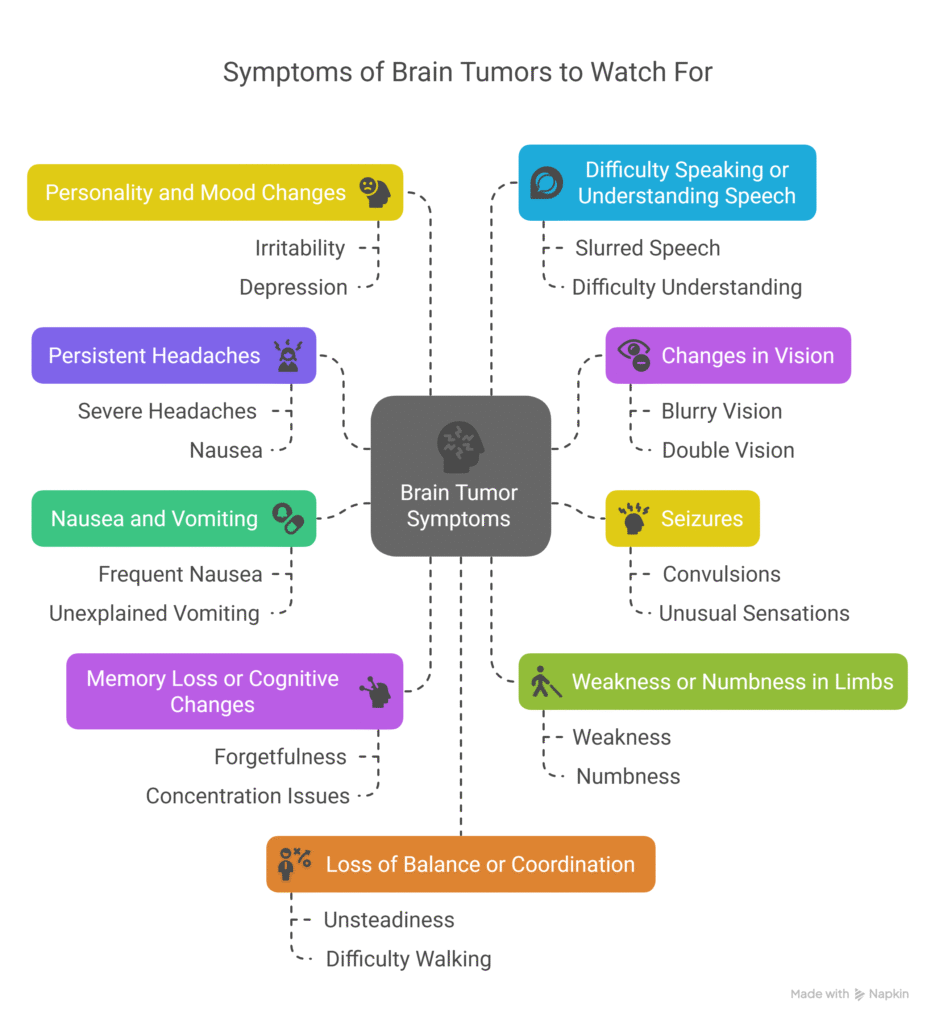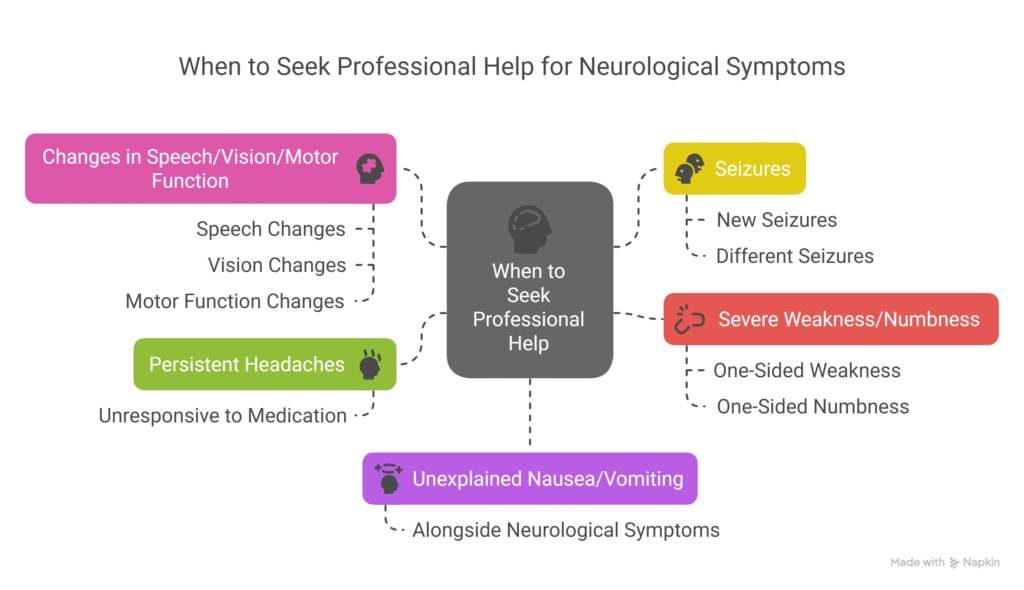How to Detect Brain Tumor at Home – Brain tumors are a serious medical condition that can affect anyone, regardless of age or gender. They can be difficult to detect in the early stages, as symptoms may be subtle or resemble other health conditions. However, knowing how to detect brain tumor at home can help you identify warning signs early on and seek medical attention if needed. Early detection plays a critical role in improving treatment outcomes and preventing further complications.

In this blog, we will discuss common signs and symptoms of brain tumors, how to monitor your health at home, and when to seek professional help. Dr. Arun Saroha, a renowned neurosurgeon, shares valuable insights on recognizing early warning signs and understanding the steps you can take to address potential concerns.
Understanding Brain Tumors
A brain tumor is a growth of abnormal cells in the brain. It can be benign (non-cancerous) or malignant (cancerous). Brain tumors can develop in any part of the brain and may cause a wide range of symptoms depending on their size, location, and type. The brain is responsible for regulating numerous functions in the body, so a tumor in any part of the brain can affect these functions, potentially leading to neurological symptoms.
While some brain tumors grow slowly and cause minimal symptoms, others can grow rapidly and cause significant issues. This is why it’s important to understand how to detect brain tumor at home and recognize the signs early on.
Symptoms of Brain Tumors to Watch For

Detecting a brain tumor at home can be challenging, but paying attention to certain symptoms can help you identify potential issues. Here are some common signs of a brain tumor that you may notice:
1. Persistent Headaches
One of the most common symptoms of a brain tumor is a headache. While headaches are common and usually harmless, a persistent or unusually severe headache could be a sign of a tumor. If the headache gets worse over time or if it is accompanied by nausea, vomiting, or dizziness, it may be time to consult a doctor.
2. Changes in Vision
A brain tumor can affect the part of the brain responsible for vision, leading to changes in sight. If you experience blurry vision, double vision, or partial loss of vision, it could be a sign that a tumor is pressing on the optic nerves. Pay attention to any changes in your vision and seek medical advice if these symptoms persist.
3. Seizures
Seizures are another potential sign of a brain tumor, especially if you have never had one before. Brain tumors can disrupt the normal electrical activity in the brain, leading to seizures. If you experience convulsions, shaking, or unusual sensations in your body, it is essential to seek medical help immediately.
4. Nausea and Vomiting
Persistent nausea and vomiting, especially when accompanied by a headache, could indicate a brain tumor. This is often caused by increased pressure inside the skull as a result of the tumor’s growth. If you find that you are frequently nauseous or vomiting without any apparent cause, it’s important to monitor your symptoms and consult a healthcare provider.
5. Memory Loss or Cognitive Changes
Brain tumors can affect memory and cognitive functions. If you notice that you are becoming forgetful, having trouble concentrating, or experiencing difficulty in completing tasks you normally could, this could be a sign of a brain tumor. These symptoms may become more noticeable over time as the tumor grows.
6. Weakness or Numbness in Limbs
A brain tumor can cause weakness or numbness in one part of the body, especially on one side. This is because the tumor may be pressing on the parts of the brain responsible for motor functions. If you notice that your arms, legs, or face feel weak or numb, it’s essential to seek medical evaluation.
7. Personality and Mood Changes
Brain tumors can alter a person’s mood, behavior, and personality. If you notice significant changes in your mood or emotional state, such as increased irritability, depression, or anxiety, this could be a sign that a tumor is affecting the brain’s emotional centers.
8. Difficulty Speaking or Understanding Speech
A brain tumor can interfere with speech and language functions. If you suddenly find it difficult to speak clearly or understand others, or if you experience slurred speech, this could be a sign of a problem with your brain. Any sudden speech difficulties should be addressed immediately.
9. Loss of Balance or Coordination
Brain tumors can affect the cerebellum, the part of the brain responsible for balance and coordination. If you notice that you are becoming unsteady on your feet or having difficulty walking, this could be a warning sign. Keep track of your balance and coordination, and consult a doctor if these symptoms worsen.
How to Detect a Brain Tumor at Home: Monitoring Symptoms
While it’s important to see a doctor for an accurate diagnosis, you can monitor your symptoms at home to assess the severity of your condition. Here are some tips on how to detect a brain tumor at home:
1. Keep a Symptom Diary
One of the best ways to monitor your symptoms is to keep a daily record of any changes in your health. Write down when your headaches occur, how often you experience nausea or dizziness, and any changes in your mood, vision, or memory. This diary will help you track patterns and provide valuable information to your healthcare provider when you seek medical attention.
2. Self-Check for Neurological Symptoms
Perform simple neurological tests at home to monitor any changes in motor function or coordination. Try standing on one leg to test your balance, or check your reflexes by tapping the bottom of your feet. Notice if you have any difficulty with these tests or experience weakness or numbness in your limbs. These signs could indicate a problem that requires further investigation.
3. Monitor Your Vision
Pay close attention to any changes in your vision. If you notice that your vision is becoming blurry or double, or if you experience sudden visual disturbances, it could indicate a problem with the brain. Try using a vision chart at home to monitor any changes in your ability to see clearly.
4. Look for Other Physical Symptoms
Monitor your body for signs of weakness, numbness, or tingling in specific areas. If you notice that certain parts of your body are feeling weaker than usual or are experiencing unusual sensations, make a note of it and bring it up with your healthcare provider.
When to Seek Professional Help

If you experience any of the symptoms mentioned above, it’s important to consult with a healthcare professional. Dr. Arun Saroha, a leading neurosurgeon, recommends seeking medical help as soon as possible if you notice any of the following:
- Persistent headaches that don’t respond to over-the-counter pain medications.
- Unexplained nausea or vomiting that occurs alongside other neurological symptoms.
- Seizures, especially if they are new or different from any previous experiences.
- Sudden changes in speech, vision, or motor function.
- Severe weakness or numbness in one side of the body.
A doctor will perform diagnostic tests, such as an MRI or CT scan, to confirm whether a brain tumor is present. Early diagnosis and treatment are critical for improving the chances of successful treatment and recovery.
Diagnosis and Treatment of Brain Tumors
If a brain tumor is detected, the treatment plan will depend on several factors, including the tumor’s size, location, type, and whether it is benign or malignant. Treatment options may include:
- Surgery: If the tumor is accessible and can be safely removed, surgery may be the best option.
- Radiation Therapy: This treatment uses high-energy rays to target and shrink the tumor.
- Chemotherapy: For malignant tumors, chemotherapy may be used to kill cancerous cells.
- Targeted Therapy: Newer treatments focus on targeting specific molecules involved in tumor growth.
- Steroids: Steroids may be prescribed to reduce swelling and pressure on the brain.
The prognosis for brain tumors varies depending on the type and stage of the tumor. Early detection significantly improves the outcome and the success of treatment.
Need Help? Reach Out Today
Contact Now!
Make An Appointment
Conclusion
Knowing how to detect a brain tumor at home is essential for identifying potential issues early. While monitoring your symptoms at home can help you track changes in your health, it’s crucial to seek medical attention as soon as you notice any signs or symptoms of a brain tumor. Dr. Arun Saroha, with his expertise in neurosurgery, can guide you through the diagnostic and treatment process, ensuring that you receive the best care possible. Early diagnosis and treatment can make a significant difference in the outcome, so don’t hesitate to seek professional help if you suspect something is wrong with your health.
What are the early warning signs of a brain tumor at home?
Common signs include persistent headaches, nausea, vision problems, memory issues, personality changes, and difficulty with balance or speech. If these symptoms last or worsen over time, medical evaluation is necessary.
Can I self-diagnose a brain tumor at home?
No, you cannot accurately self-diagnose a brain tumor at home. However, noticing unusual or persistent neurological symptoms can help you decide when to seek medical attention.
What home observations may indicate a brain tumor?
Watch for signs like frequent morning headaches, unsteady walking, blurred vision, seizures, or unusual confusion. These symptoms don’t confirm a tumor but can be early indicators.
When should I consult a doctor if I suspect a brain tumor?
If you experience consistent symptoms such as seizures, personality changes, memory loss, or balance problems, consult a neurologist immediately for further tests like MRI or CT scans.









